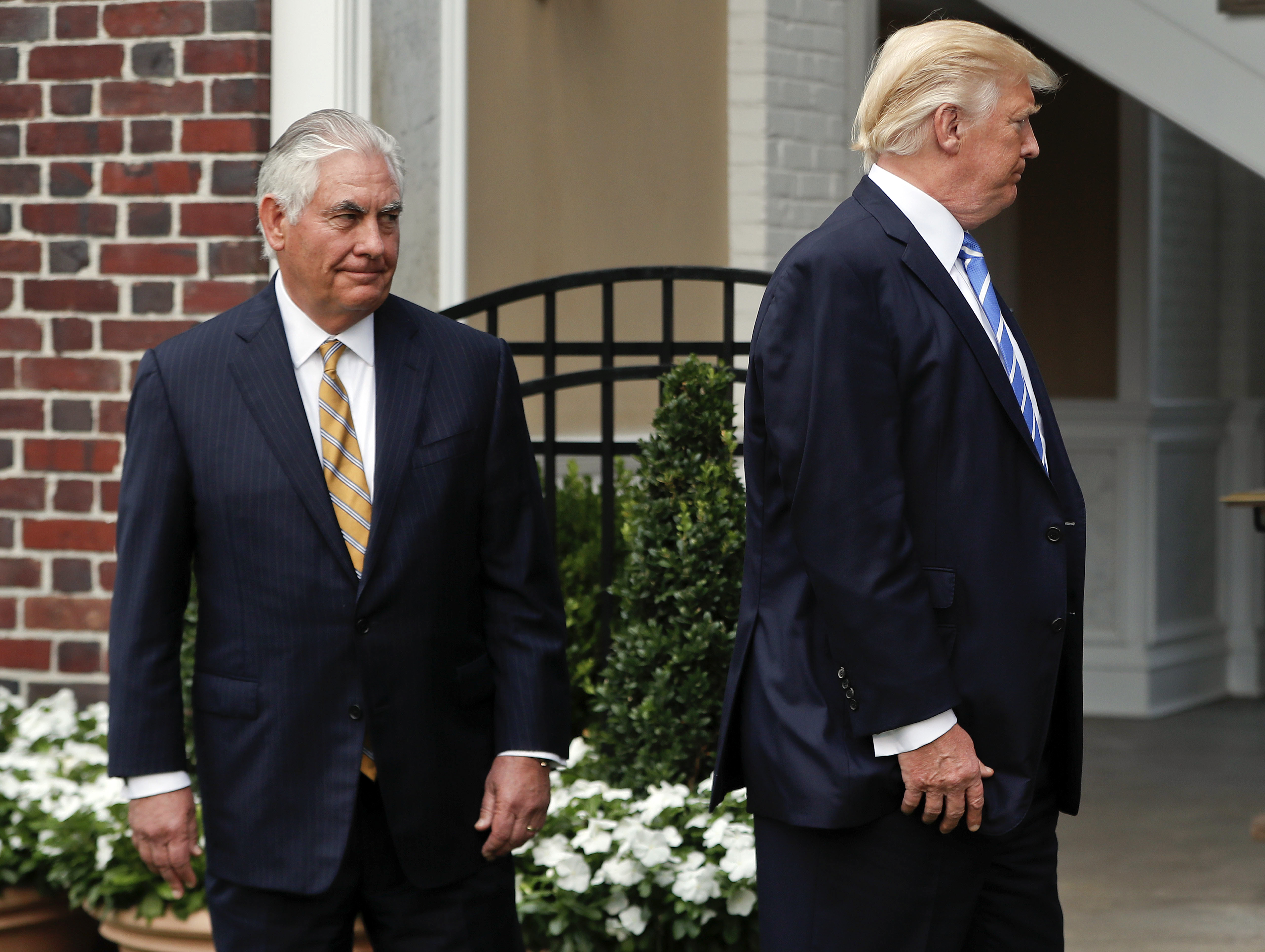Tillerson, Trump, and the White House smokescreen of lies
The secretary of state's sudden ouster is yet another example of the Trump administration's sinister subversion of information and truth


A free daily email with the biggest news stories of the day – and the best features from TheWeek.com
You are now subscribed
Your newsletter sign-up was successful
It seems that no one thought Rex Tillerson was a good secretary of state — not the career diplomats who have fled from their jobs at the State Department on his watch, not the foreign policy analysts who have pointed to his poor management of the department and clumsy dealings with foreign governments and dignitaries, and not the president himself, who had griped about Tillerson's performance for months and then summarily fired him via a tweet on Tuesday morning.
The most noteworthy thing about the transition at the State Department is not Tillerson's departure itself or the pending appointment of CIA Director Mike Pompeo as his successor — or, for that matter, the pending appointment of CIA deputy director Gina Haspel to take over for Pompeo in Langley, Virginia.
The most noteworthy thing about this staff shakeup is the way it was handled. As always, it was a confusing morass of lies, distortions, and contradictions. This is important.
The Week
Escape your echo chamber. Get the facts behind the news, plus analysis from multiple perspectives.

Sign up for The Week's Free Newsletters
From our morning news briefing to a weekly Good News Newsletter, get the best of The Week delivered directly to your inbox.
From our morning news briefing to a weekly Good News Newsletter, get the best of The Week delivered directly to your inbox.
Where other administrations have aimed, if not always for transparency, then at least for consistency across the executive branch, the Trump White House fails to maintain even the most minimal levels of stability or coherence. To gauge how far it diverges from established norms of professionalism, imagine how Tillerson's dismissal likely would have unfolded in any other administration.
For months the president has publicly expressed displeasure and disagreement with his own secretary of state. To wit:
In such a situation, where everyone in a normal administration knows a Cabinet official just isn't working out, there would have been a quietly coordinated departure, with Trump and Tillerson releasing harmonious statements that described the decision as amicable. "It was time for me to move on," the secretary would have said, and the world would have shrugged its shoulders and focused attention on evaluating his likely successor.
Obviously, that didn't happen.
A free daily email with the biggest news stories of the day – and the best features from TheWeek.com
So let's assume another possibility — that Tillerson was summarily fired, as some have speculated, for his relatively harsh statement on Monday blaming Russia for a nerve gas attack in the U.K. Even in this more ominous case, another administration would have worked with Tillerson to ensure coordination. The White House would have issued a statement thanking Tillerson for his service but making plain that his recent statements had gotten too far out ahead of the administration's position, and so he had been asked to step down. Tillerson would then have issued his own statement saying that he serves at the pleasure of the president and that it's been an honor and privilege to serve his country.
This would have been hugely controversial in the context of the U.K. attack and the special counsel's ongoing Russia investigation. But at least the public would have understood something of the truth of the administration's motives, which could then be debated and judged in the court of public opinion.
But this didn't happen either.
Instead, the White House claims Tillerson was informed last week that he was on the way out. Tillerson claims that this morning's firing came as a complete surprise. And now the official who made this statement on Tillerson's behalf (Undersecretary of State Steve Goldstein) has been fired for contradicting the White House on the matter.
Where in all of this chaos is the truth? When was the decision made to fire Tillerson? And what was the motive? We can speculate, but we will most likely never know for sure. Trump's defenders in the right-wing media will fasten onto the most benign possibilities and run with them, while others will emphasize more sinister alternatives, and neither will be able to refute the other's assertions because there will be evidence to support each side — and a very long track record of blatant, almost flamboyant lying from the White House to undercut the trustworthiness of anything the president or his aides and advisers say on the matter.
Is the chaos deliberate? Perhaps. But it's far more likely that it's a product of a systemic sloppiness that merely serves Trump's interests — as it would serve the interests of any would-be authoritarian. When no one can know for certain what's happening or why, those in positions of power increase their freedom of movement and action. Democratic accountability requires the ability of citizens to become informed about the behavior of those in charge and assess it. But this becomes impossible when what's happening takes place behind a smokescreen of lies, contradictions, and outright disinformation.
With Tillerson's chaotic departure on Tuesday, the United States slid just a little bit further in the direction of despotism. The secretary of state was fired, no one really knows when or why, and there's nothing that anyone can do about it.
Damon Linker is a senior correspondent at TheWeek.com. He is also a former contributing editor at The New Republic and the author of The Theocons and The Religious Test.
-
 Nepal’s fake mountain rescue fraud
Nepal’s fake mountain rescue fraudUnder The Radar Arrests made in alleged $20 million insurance racket
-
 History-making moments of Super Bowl halftime shows past
History-making moments of Super Bowl halftime shows pastin depth From Prince to Gloria Estefan, the shows have been filled with memorable events
-
 The Washington Post is reshaping its newsroom by laying off hundreds
The Washington Post is reshaping its newsroom by laying off hundredsIn the Spotlight More than 300 journalists were reportedly let go
-
 The billionaires’ wealth tax: a catastrophe for California?
The billionaires’ wealth tax: a catastrophe for California?Talking Point Peter Thiel and Larry Page preparing to change state residency
-
 Bari Weiss’ ‘60 Minutes’ scandal is about more than one report
Bari Weiss’ ‘60 Minutes’ scandal is about more than one reportIN THE SPOTLIGHT By blocking an approved segment on a controversial prison holding US deportees in El Salvador, the editor-in-chief of CBS News has become the main story
-
 Has Zohran Mamdani shown the Democrats how to win again?
Has Zohran Mamdani shown the Democrats how to win again?Today’s Big Question New York City mayoral election touted as victory for left-wing populists but moderate centrist wins elsewhere present more complex path for Democratic Party
-
 Millions turn out for anti-Trump ‘No Kings’ rallies
Millions turn out for anti-Trump ‘No Kings’ ralliesSpeed Read An estimated 7 million people participated, 2 million more than at the first ‘No Kings’ protest in June
-
 Ghislaine Maxwell: angling for a Trump pardon
Ghislaine Maxwell: angling for a Trump pardonTalking Point Convicted sex trafficker's testimony could shed new light on president's links to Jeffrey Epstein
-
 The last words and final moments of 40 presidents
The last words and final moments of 40 presidentsThe Explainer Some are eloquent quotes worthy of the holders of the highest office in the nation, and others... aren't
-
 The JFK files: the truth at last?
The JFK files: the truth at last?In The Spotlight More than 64,000 previously classified documents relating the 1963 assassination of John F. Kennedy have been released by the Trump administration
-
 'Seriously, not literally': how should the world take Donald Trump?
'Seriously, not literally': how should the world take Donald Trump?Today's big question White House rhetoric and reality look likely to become increasingly blurred
